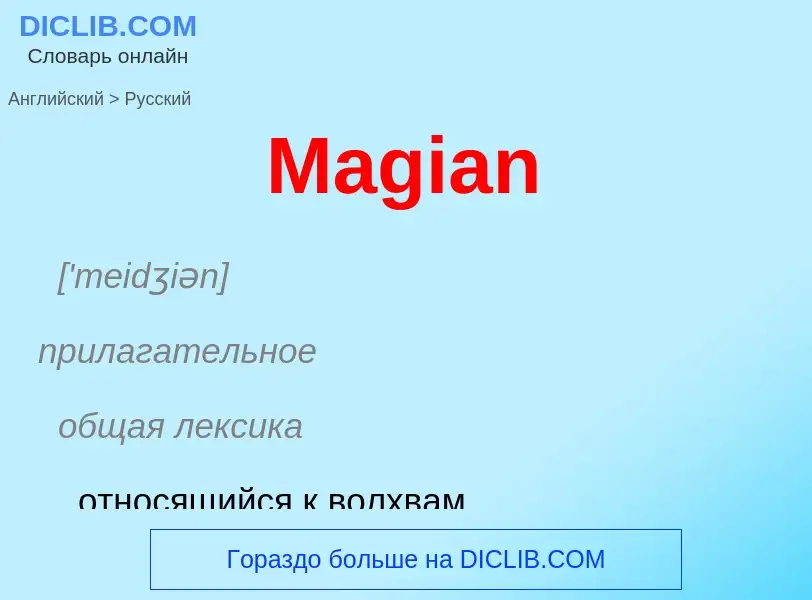Translation and analysis of words by ChatGPT artificial intelligence
On this page you can get a detailed analysis of a word or phrase, produced by the best artificial intelligence technology to date:
- how the word is used
- frequency of use
- it is used more often in oral or written speech
- word translation options
- usage examples (several phrases with translation)
- etymology
Magian - translation to russian
['meidʒiən]
прилагательное
общая лексика
относящийся к волхвам
волшебный
существительное
['meidʒiən]
общая лексика
волхв
маг
волшебник
['meidʒai]
существительное
общая лексика
волхвы
маги
Definition
Wikipedia

Magi (; singular magus ; from Latin magus, cf. Persian: مغ pronounced [moɣ]) were priests in Zoroastrianism and the earlier religions of the western Iranians. The earliest known use of the word magi is in the trilingual inscription written by Darius the Great, known as the Behistun Inscription. Old Persian texts, predating the Hellenistic period, refer to a magus as a Zurvanic, and presumably Zoroastrian, priest.
Pervasive throughout the Eastern Mediterranean and Western Asia until late antiquity and beyond, mágos (μάγος) was influenced by (and eventually displaced) Greek goēs (γόης), the older word for a practitioner of magic, to include astronomy/astrology, alchemy, and other forms of esoteric knowledge. This association was in turn the product of the Hellenistic fascination for Pseudo-Zoroaster, who was perceived by the Greeks to be the Chaldean founder of the Magi and inventor of both astrology and magic, a meaning that still survives in the modern-day words "magic" and "magician".
In the Gospel of Matthew, "μάγοι" (magoi) from the east do homage to Jesus, a child and the transliterated plural "magi" entered English from Latin in this context around 1200 (this particular use is also commonly rendered in English as "kings" and more often in recent times as "wise men"). The singular "magus" appears considerably later, when it was borrowed from Old French in the late 14th century with the meaning magician.
Hereditary Zoroastrian priesthood has survived in India and Iran. They are termed Herbad, Mobad (Magupat, i.e. chief of the Maga), and Dastur depending on the rank.


![Brihat Samhita of [[Varahamihira]], 1279 CE palm leaf manuscript, Pratima lakshana, Sanskrit Brihat Samhita of [[Varahamihira]], 1279 CE palm leaf manuscript, Pratima lakshana, Sanskrit](https://commons.wikimedia.org/wiki/Special:FilePath/6th-century Brihat Samhita of Varahamihira, 1279 CE Hindu text palm leaf manuscript, Pratima lakshana, Sanskrit, Nepalaksara script, folio 1 talapatra from a Buddhist monastery, 1v, 2r 2v leaves.jpg?width=200)
![Melchior]], oldest, bearing [[myrrh]] and representing Europe. Melchior]], oldest, bearing [[myrrh]] and representing Europe.](https://commons.wikimedia.org/wiki/Special:FilePath/Adoracao dos magos de Vicente Gil.jpg?width=200)

![Three Magi]] in a 6th-century mosaic at [[Basilica of Sant'Apollinare Nuovo]] Three Magi]] in a 6th-century mosaic at [[Basilica of Sant'Apollinare Nuovo]]](https://commons.wikimedia.org/wiki/Special:FilePath/Magi (1).jpg?width=200)
![Incised [[sarcophagus]] slab with the ''[[Adoration of the Magi]]'' from the [[Catacombs of Rome]], 3rd century Incised [[sarcophagus]] slab with the ''[[Adoration of the Magi]]'' from the [[Catacombs of Rome]], 3rd century](https://commons.wikimedia.org/wiki/Special:FilePath/XV14 - Roma, Museo civiltà romana - Adorazione dei Magi - sec III dC - Foto Giovanni Dall'Orto 12-Apr-2008.jpg?width=200)
